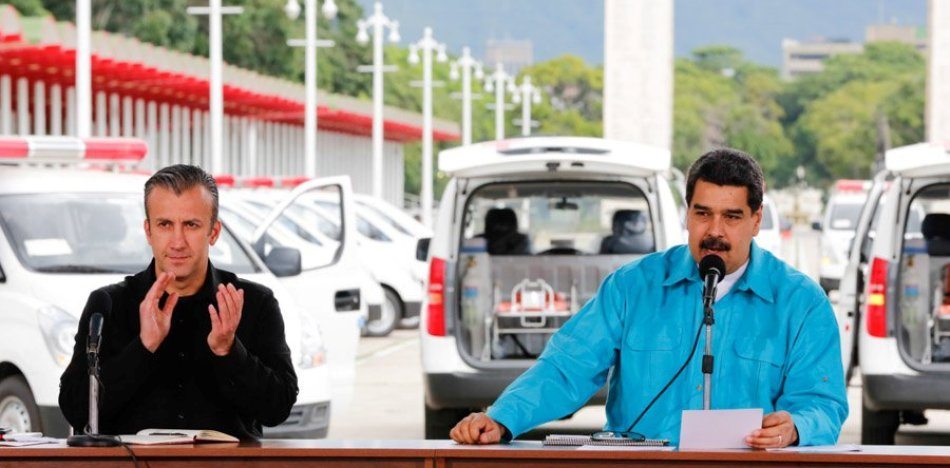
EspañolVenezuelan President Nicolás Maduro has to pay off US $1.22 million in debt this Friday, after which he will “decree” a new plan for restructuring the country’s finances.
Venezuela’s debt, equivalent to US $21 billion when Hugo Chávez took power in 1999, is now over US $184 billion. It was contracted, in its vast majority, between 2007 and 2012 when the Chávez not only squandered oil revenue, but also borrowed heavily to finance his socialist farce.
Maduro, the heir to these ruins, believes he can force shareholders of the state-owned oil company PDVSA and public bonds to sit down at a negotiating table with Vice President Tareck El Aissami and sort through the mess. El Aissami has little to no training in economics, and poses a risk to the process due to the sanctions placed on him by the United States. No bond or investment fund holder from the US can talk to him about anything beyond the weather.
Maduro has created the myth of an “economic war” being waged by the US to distance his regime from financial troubles and bondholders’ unwillingness to negotiate the Venezuelan debt, which could potentially force 30 million people into abject poverty.
The last country that found itself even close to this position was Argentina, which defaulted in 2001. Since 2005, the country has been mired in controversy due to the so-called “vulture funds” that ended in 2016 when President Mauricio Macri took office. The Argentine situation, however, is nowhere near as bad as the crisis in Venezuela, which just experienced its first month of hyperinflation, and whose external debt is equivalent to 430 percent of its exports.
This December, Venezuela has to pay a PDVSA bond worth $500 million. Next year, it has to pay another $8 billion. Maduro claims that they “are going to do a complete reformatting of external payments to balance the budget and cover the needs of the country.” But it remains to be seen whether the market will accept that proposal. Perhaps some will accept negotiations, but until everyone can deal with Venezuela in the same way, foreign markets will remain closed.
Stages of debt
Venezuela already knows what negotiations mean for the exchange of 2017 PDVSA bonds, which, in order to be changed by 2020, would have had to have paid higher interest rates and a greater discount than the bond holders prior to the exchange. Even so, they barely managed to pass an exchange rate with half of the bond holders.
The country also doesn’t have the help of multilateral organizations, and for a very simple reason: without a coherent economic program, no multilateral investor will want to put their money in Venezuela, and (almost) no bondholder will accept restructuring.
Maduro complained again today that he did not have support for debt restructuring in the markets, even though Venezuela has been a punctual payer. He forgets, as people often do, that credit doesn’t come from what has been paid in the past, but from what can be paid in the future.
Maduro’s decision can and will put his country in a much more serious situation than anything it has experienced up to this point. The Venezuelan debt will become impossible to pay, as the rapidly deteriorating Bolivar loses all value. If the market closes down Venezuela’s short-term financing mechanisms, the Venezuelan crisis will get much worse next year, even without taking into account potential asset freezes or seizures. If some agree to negotiate and others do not, as was the case in Argentina, the situation will be a little more manageable. But still, the Argentines closed the market for three decades.
What if there is manipulation?
Two economic analysts consulted by PanAm Post who gave their analysis under the condition to remain anonymous, highlighted two fundamental factors: Nicolás Maduro’s admission that he ran out of money, and his concern that Venezuela’s bonds could be manipulated by some of their holders — namely Venezuelan elites and government members, who might want to raise or lower the market for personal profit.
- Read More: Venezuela’s Economy Is So Broken Its New Highest-Value Bill Is Worth Just US $2
- Read More: Maduro Raises Minimum Wage to USD $11 Per Month as Hyperinflation Rages on in Venezuela
Since 2013, speculation has swirled around the possibility that Venezuelan capitals, linked to the boliburguesía (or Bolivarian bourgeoisie) has bought Venezuelan bonds, thereby legitimizing their capital, and have made sure that payments were made with the highest interest rates in the world. Maduro’s announcement, however, would jeopardize some of these assets for the first time.
The Securities Exchange Commission, who considers any manipulation of the market a punishable offense, may begin to pay more attention to Venezuelan bonds. One of the economists consulted by PanAm Post considered Maduro’s announcement “very strange,” pointing to a manipulation of the market, because the bonds are going to collapse as of today, and they had been rising sharply yesterday.
The question is: who benefits from this decision?
Hopefully, for once, it’s the Venezuelan people.
 Versión Español
Versión Español












